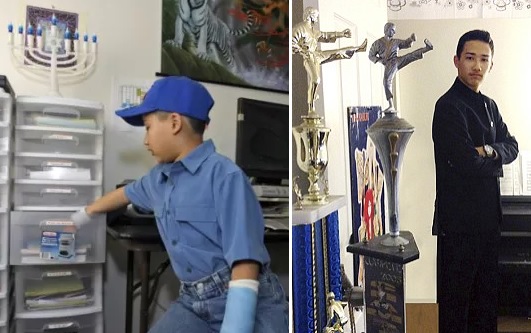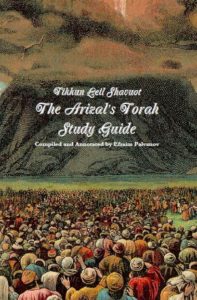Two Math Wizards
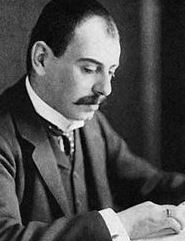
Edmund Landau
Edmund Georg Hermann Landau (1877-1938) was born in Berlin. As a young boy, he was recognized as a math prodigy, and earned his Ph.D from the University of Berlin by 22. He immediately received a teaching position at the university, where he taught for the next ten years. Meanwhile, Landau married the daughter of Nobel Prize winner (and past Jew of the Week) Paul Ehrlich. In 1812, Landau presented four complex math problems at the International Congress of Mathematicians. The problems remain unsolved to this day. After over a decade teaching at the University of Göttingen, Landau joined the new Hebrew University. He was a co-founder of its math department, and played a key role in the construction of its Mathematics Institute. He taught himself Hebrew so that he could present a novel math lecture at the University’s grand opening in 1925. Two years later, Landau and his family made aliyah. He taught at the Hebrew University for several years before returning to Göttingen. After being removed from his position by the Nazis, Landau settled back in Berlin and occasionally traveled outside Germany to teach. He died four years later. Landau is renowned for his work on distribution of prime numbers, and on what is now called Landau Prime Ideal Theorem. It was once said that “no one was ever more passionately devoted to mathematics than Landau.”
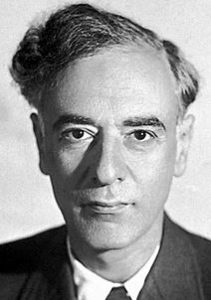
Lev Landau
Edmund Landau is not to be confused with another Jewish math prodigy, Lev Davidovich Landau (1908-1968). Born in Azerbaijan (then part of Russia), Lev Landau started university at 13, published his first paper at 18, and got his PhD in math by 26. He received a scholarship from the Soviet government as well as the Rockefeller Foundation to travel and study abroad. He was soon fluent in German, French, Danish, and English. Much of his time was spent working in the lab of Nobel Prize winner (and past Jew of the Week) Niels Bohr. After returning to the Soviet Union, Landau was put at the head of the physics department at Kharkiv Institute of Physics and Technology. He taught at the University of Kharkiv, and at the same time worked with his student Evgeny Lifshitz on a ten-volume textbook. The Course of Theoretical Physics is still one of the most popular graduate physics textbooks used today. In 1938, Landau was arrested for comparing Stalin to the Nazis. After the intervention of other physicists, he was freed. Ironically, he won the Stalin Prize in 1949 and again in 1953, for his work on building the first Soviet nuclear bomb. Landau is famous for, among many other things, his theory of superconductivity, theory of Fermi liquid, for plasma physics, quantum electrodynamics, and most of all for his theory of superfluidity, which won him a Nobel Prize in 1962. Unfortunately, he couldn’t personally collect the prize because he was in a severe car accident and spent two months in a coma. He ultimately died from his injuries in 1968. Several years before this, his students established the Landau Institute for Theoretical Physics near Moscow. It is still one of the most prestigious physics labs in Russia. Landau was featured in the latest Google Doodle. There is a crater on the moon named after him.
The Torah: A Comprehensive Overview
Words of the Week
Both religion and science require a belief in God. For believers, God is in the beginning, and for physicists He is at the end of all considerations… To the former He is the foundation, to the latter, the crown of the edifice of every generalized world view.
– Max Planck
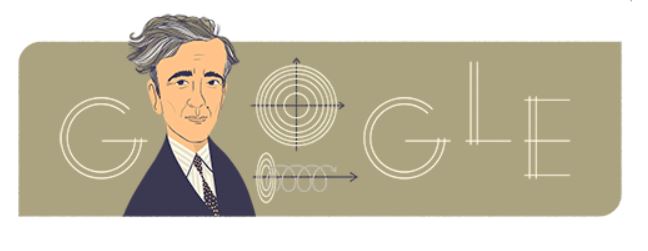
Google Doodle for January 22, 2019, the birthday of Lev Landau.

 Edith Stern (b. 1952) was born in Brooklyn to impoverished Holocaust survivors who had married in the Warsaw Ghetto. Her father, Aaron Stern, had been a professor of languages (he was fluent in seven). When his daughter was born, he called a press conference – to which two reporters showed up – and declared: “I shall make her into the perfect human being.” Thus began what journalists at the time called “the Edith Project”. Stern immediately immersed his daughter in learning. He exposed her only to classical music, talked to her all the time, and taught her with flash cards. Suffering from jaw cancer and unable to work, Stern spent all of his time with Edith. By the age of 5, Edith had read through the entire Encyclopedia Britannica. Although her father did not believe in IQ tests, she nonetheless scored a 205 that same year. Edith enrolled in college at 12, earned her BS in mathematics by 15, and her Master’s at 18. By this point, she was already teaching at Michigan State University. She went on to defend her Ph.D and joined IBM’s R&D division. Today, Stern holds over 100 patents for technological innovations used in telephones, digital media, video conferencing, self-driving cars, and the internet. Stern is still a “distinguished engineer” at IBM, where she is a VP, and recently won the Kate Gleason Award for lifetime achievement in technology. Although her mother once disagreed with her father about his methods, she later concluded that it had made her a “very mature, compassionate, kind, intelligent and wise young woman.” Her father maintained that being a genius has little to do with genetics, and everything to do with how a child is raised and educated. He wrote in his 1971 The Making of a Genius: “I can foster the same meteoric IQ in the children of the Tasaday tribe, a Stone Age people living in the Philippines.”
Edith Stern (b. 1952) was born in Brooklyn to impoverished Holocaust survivors who had married in the Warsaw Ghetto. Her father, Aaron Stern, had been a professor of languages (he was fluent in seven). When his daughter was born, he called a press conference – to which two reporters showed up – and declared: “I shall make her into the perfect human being.” Thus began what journalists at the time called “the Edith Project”. Stern immediately immersed his daughter in learning. He exposed her only to classical music, talked to her all the time, and taught her with flash cards. Suffering from jaw cancer and unable to work, Stern spent all of his time with Edith. By the age of 5, Edith had read through the entire Encyclopedia Britannica. Although her father did not believe in IQ tests, she nonetheless scored a 205 that same year. Edith enrolled in college at 12, earned her BS in mathematics by 15, and her Master’s at 18. By this point, she was already teaching at Michigan State University. She went on to defend her Ph.D and joined IBM’s R&D division. Today, Stern holds over 100 patents for technological innovations used in telephones, digital media, video conferencing, self-driving cars, and the internet. Stern is still a “distinguished engineer” at IBM, where she is a VP, and recently won the Kate Gleason Award for lifetime achievement in technology. Although her mother once disagreed with her father about his methods, she later concluded that it had made her a “very mature, compassionate, kind, intelligent and wise young woman.” Her father maintained that being a genius has little to do with genetics, and everything to do with how a child is raised and educated. He wrote in his 1971 The Making of a Genius: “I can foster the same meteoric IQ in the children of the Tasaday tribe, a Stone Age people living in the Philippines.”
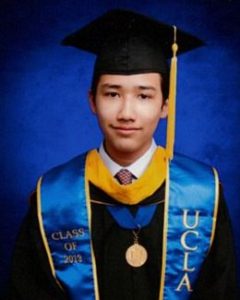 Moshe Kai Cavalin (b. 1998) was born in Los Angeles, the son of a Taiwanese mother and an Israeli-Brazilian father. He started speaking at 4 months of age, and was reading and doing math by 3. At 6, he was rejected from elementary school because he “knew more than the teacher”, and had to be home-schooled. At 8, he became the youngest person in American history to take college classes. He got his first degree three years later, with a perfect 4.0 GPA. He then enrolled at UCLA – with a full scholarship – and earned a BS in mathematics. Meanwhile, Kai wrote two bestselling books (an inspirational autobiography, and a manual to deal with bullying). For fun, he scuba dives, plays piano, and chess, and avoids video games which, he says, are “not helping humanity in any way.” He is also an avid martial artist – thanks to his father, a former IDF special forces commando – and has won 26 gold medals. Incredibly, Kai got a pilot’s license, too. This led to a phone call from NASA in 2015. NASA needed a pilot who also knew math, physics, and computer programming to develop surveillance and anti-collision technology for drones and airplanes. Kai has been at NASA ever since, working hard to keep the skies safe. He is concurrently doing his Master’s in cybersecurity, and intends to later get a Master’s in business from MIT before opening his own cybersecurity company. Kai describes himself as a religious person and often credits God with giving him the insight to solve problems. One of his professors once said: “I think most people just think he’s a genius, they believe it just comes naturally… He actually worked harder than, I think, any other student I’ve ever had.”
Moshe Kai Cavalin (b. 1998) was born in Los Angeles, the son of a Taiwanese mother and an Israeli-Brazilian father. He started speaking at 4 months of age, and was reading and doing math by 3. At 6, he was rejected from elementary school because he “knew more than the teacher”, and had to be home-schooled. At 8, he became the youngest person in American history to take college classes. He got his first degree three years later, with a perfect 4.0 GPA. He then enrolled at UCLA – with a full scholarship – and earned a BS in mathematics. Meanwhile, Kai wrote two bestselling books (an inspirational autobiography, and a manual to deal with bullying). For fun, he scuba dives, plays piano, and chess, and avoids video games which, he says, are “not helping humanity in any way.” He is also an avid martial artist – thanks to his father, a former IDF special forces commando – and has won 26 gold medals. Incredibly, Kai got a pilot’s license, too. This led to a phone call from NASA in 2015. NASA needed a pilot who also knew math, physics, and computer programming to develop surveillance and anti-collision technology for drones and airplanes. Kai has been at NASA ever since, working hard to keep the skies safe. He is concurrently doing his Master’s in cybersecurity, and intends to later get a Master’s in business from MIT before opening his own cybersecurity company. Kai describes himself as a religious person and often credits God with giving him the insight to solve problems. One of his professors once said: “I think most people just think he’s a genius, they believe it just comes naturally… He actually worked harder than, I think, any other student I’ve ever had.”